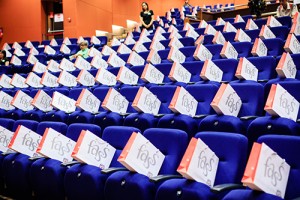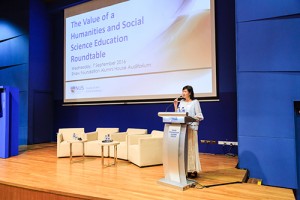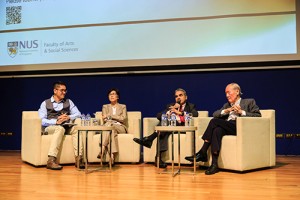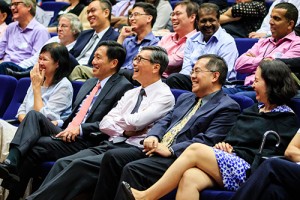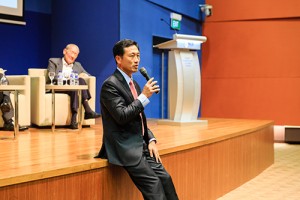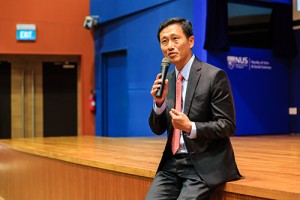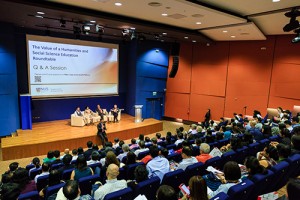The National University of Singapore (NUS) Faculty of Arts and Social Sciences (FASS) has revised its curriculum in a move to further enrich the undergraduate experience in the Arts and Social Sciences academic disciplines and to better prepare students for the future of work. The curriculum revision was introduced on 7 September, in conjunction with a roundtable discussion titled “The Value of a Humanities and Social Science Education” organised by the Faculty.
Undergraduates who are admitted from Academic Year 2016/2017 onwards will benefit from the latest curriculum revision, a process that began in 2014. The revisions were carefully deliberated and structured with the aim of strengthening the foundation for first-year students, providing more breadth for these students to explore their interests, while continuing to ensure depth in the major disciplines.
Prof Brenda Yeoh, Dean of FASS, said, “The education landscape has evolved rapidly over the last five years. A good, rigorous university education needs to be forward-looking to remain relevant to real-world settings and prepare students for the future of work. This latest revision to the Arts and Social Sciences curriculum is hence timely, after much deliberation and consultation with faculty members, students and employers. The revision retains and augments the hallmarks of the curriculum – flexibility, breadth, and depth – while it enhances students’ overall educational experience.”
“Increasingly, many of our students are taking up a second Major and signing up for internships under NUS Overseas Colleges and other programmes. Many of them have to extend their studies by six months to a year to take up these valuable opportunities. The revised curriculum will allow our students to pursue their interests and achieve a more all-rounded learning experience at NUS and also graduate on time,” Prof Yeoh added.
The last major revision to the Arts and Social Sciences curriculum took place more than 10 years ago. Over the years, regular reviews were conducted to ensure that the curriculum remains relevant to industry needs and market demands.
Key changes to the NUS Arts and Social Sciences undergraduate curriculum
Three key changes have been introduced to the NUS Arts and Social Sciences undergraduate curriculum – introduction of two new compulsory core modules on writing and communication; restructuring of the requirements for Majors and Electives; and formalisation of internships into the undergraduate curriculum.
- Two new compulsory core modules on writing and communication
Two core modules – “Writing Academically: Arts & Social Sciences” and “Public Writing and Communication” – have been introduced to boost students’ skills in writing, expression, and communication. These modules cover writing, presentation and speaking skills, which are core competencies essential to effective and successful communication. As new ideas and knowledge continue to evolve at the workplace, NUS Arts and Social Sciences graduates will benefit from possessing these enduring communication skills, regardless of their chosen profession.
These modules will be conducted for about 1,600 freshmen entering the Faculty each year through lectures via the Massive Open Online Course platforms and two-hour weekly seminars comprising up to 15 students per class.
- Restructuring of the requirements for Majors and Electives
The curriculum has also been restructured to allow greater flexibility for undergraduates pursuing a broad-based education to explore other interests such as to take up double majors and internships, within the normal candidature period of four years.
Under the existing curriculum, Arts and Social Sciences students who pursue a single major Honours degree need to fulfil five modules under University Level Requirements, three Faculty Core modules, 23 modules under the students’ selected major, and seven modules under Unrestricted Electives.
The revised curriculum will be restructured as follows:
(a) Expansion of Unrestricted Electives (UE) Space
Students can now have an option to take up a maximum of nine UE modules(equivalent to 36 modular credits). Those who prefer more breadth in their learning can make use of the two additional module spaces to pursue non-major or cross-faculty modules, while students who prefer to delve deeper into their majors could take up two more modules in their major disciplines. All single-major students will need to achieve at least 28 modular credits or seven modules under UE.
(b) Expansion of Faculty Core Modules
The number of core modules that students need to pursue has been increased to five modules to include the two new modules on writing and communication.
(c) Restructuring of Major Space
To accommodate the expanded Faculty Core and UE space, the minimum major requirements have been reduced from 23 modules to between 19 to 21 modules under the revised curriculum. While giving students the flexibility to pursue more broad-based subjects, the Faculty has ensured that the graduation requirements for major disciplines still puts its undergraduate programmes on par with established universities overseas.
- Internships formalised as part of the curriculum
Internships prepare students for work upon graduation and give them the opportunity to engage potential employers to translate their internships into job opportunities.
Under the existing curriculum, students who major in social work are required to undertake internships as part of their course. Discipline-related elective internships are also available for 10 other courses including theatre, philosophy and communications and new media. Each year, about 170 Arts and Social Sciences students go on these credit-bearing discipline-related internships. In addition, about 400 to 500 students pursue various non discipline-related internships, without credits, annually.
By formalising internships as part of the undergraduate curriculum, the Faculty hopes to encourage more students to accumulate valuable work-related experience prior to graduation. Under the revised curriculum, students may earn up to 12 modular credits (equivalent to three modules) by enrolling in the following internship modules:
(a) FASS Exposure Internship (two modular credits)
These internships are work assignments of at least 65 hours. Students can take up the internship at any time during their candidature period.
(b) FASS Internship (four modular credits or equivalent to one module)
Students who opt for this internship can choose to carry out the work assignment on a part-time basis during the regular semester (between 12 to 16 weeks) or on a full-time basis during vacation (between 8 to 12 weeks during special terms).
(c) FASS Extended Internship (eight modular credits or equivalent to two modules)
Students who pursue this internship will carry out the work assignment over 12 to 16 weeks during the regular semester.
The second and third options may be combined for an internship that lasts for up to six months. Modular credits accumulated through the above internships can contribute towards the fulfilment of the Unrestricted Electives requirement.
The above revisions to the curriculum will apply to the latest intake of students who are admitted into the Faculty in August 2016.
Click here for the Straits Times report on the curriculum revision.
Click here for the speech by Mr Ong Ye Kung, Acting Minister for Education (Higher Education and Skills) at the launch event.
